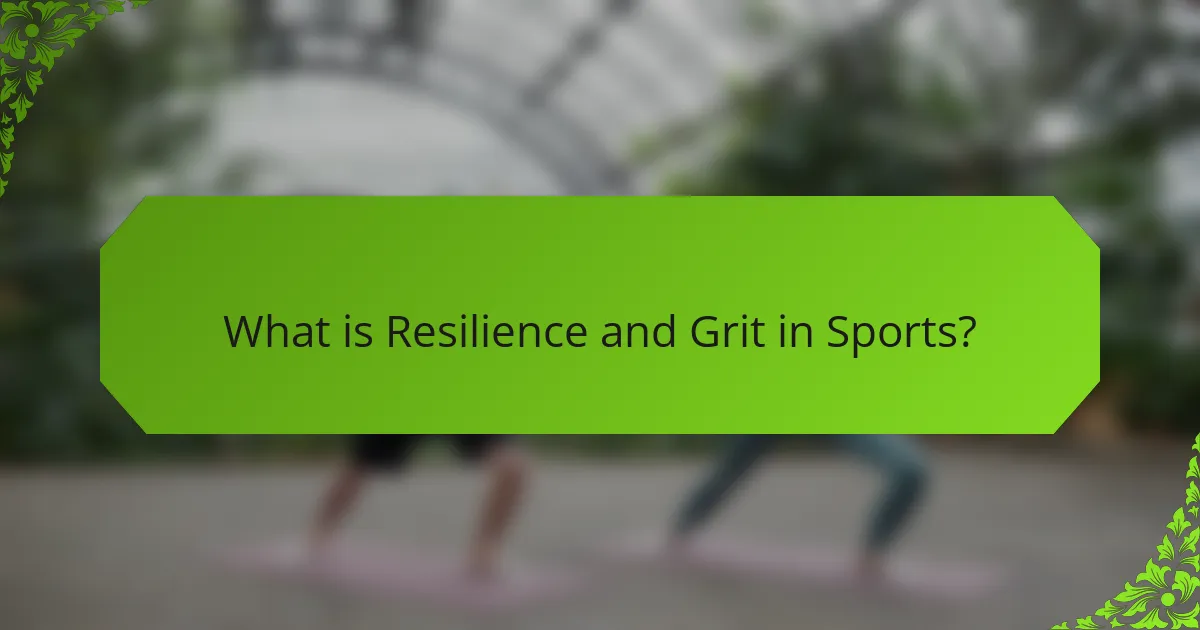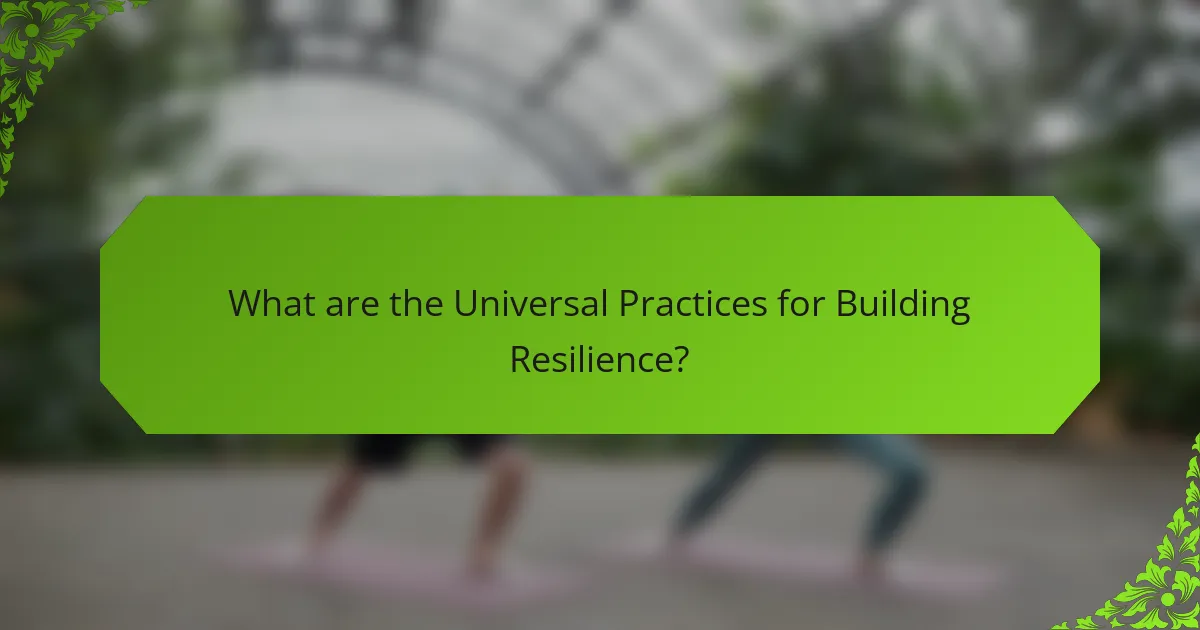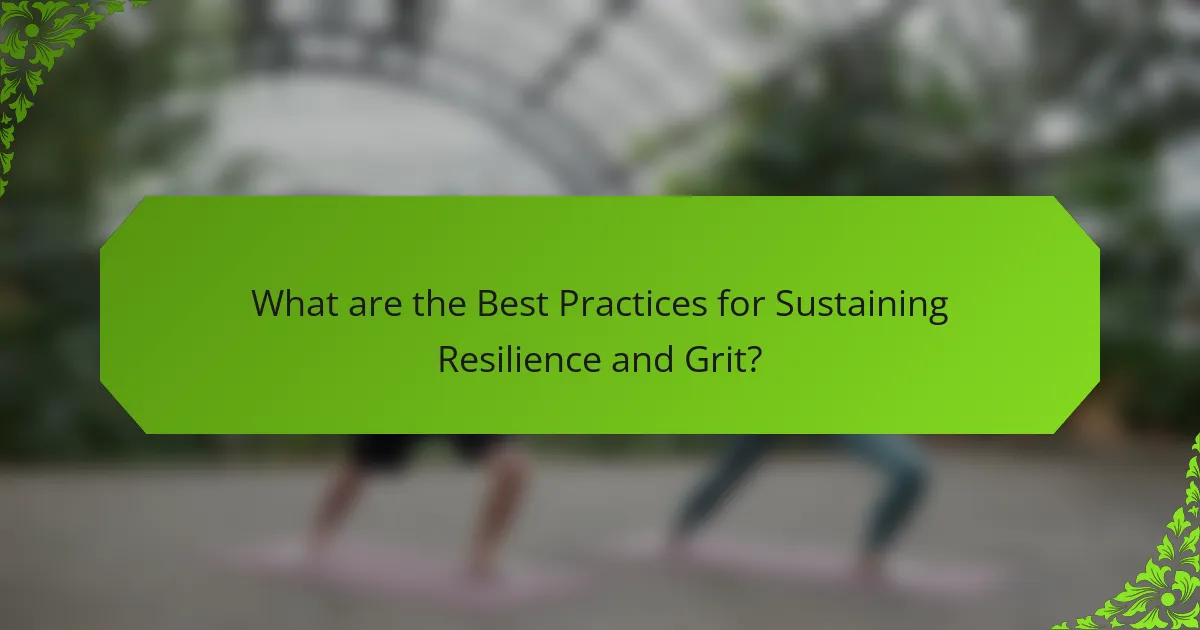Resilience and grit are crucial for amateur athletes facing challenges in sports. This article explores how to build resilience through goal-setting, a positive mindset, and learning from failures. It also discusses strategies to cultivate grit by embracing discomfort and maintaining consistency. Additionally, it highlights common mistakes that hinder resilience and offers methods to enhance mental toughness and emotional regulation.

What is Resilience and Grit in Sports?
Resilience and grit are essential for amateur athletes to overcome challenges in sports. Resilience involves bouncing back from setbacks, while grit refers to perseverance and passion for long-term goals. Together, they enhance performance and foster mental toughness. Studies show that athletes with high resilience and grit are more likely to succeed, as they can navigate adversity effectively. Developing these traits can lead to improved focus, motivation, and overall athletic achievement.
How do Resilience and Grit influence athletic performance?
Resilience and grit significantly enhance athletic performance by enabling athletes to persist through challenges. These traits foster mental toughness, allowing athletes to maintain focus during adversity. Research shows that athletes with higher resilience exhibit improved recovery and adaptability, leading to better overall performance. Grit, characterized by sustained effort and passion for long-term goals, contributes to consistent training and dedication, directly impacting success in sports.
What are the psychological foundations of Resilience and Grit?
Resilience and grit stem from psychological principles that help athletes navigate challenges. Resilience involves adapting to adversity, while grit reflects sustained effort toward long-term goals. Both traits enhance performance and mental toughness in amateur athletes. Research shows that resilient individuals are more likely to recover from setbacks, while those with grit maintain motivation despite difficulties. Developing these traits can significantly improve an athlete’s ability to overcome obstacles.

What are the Universal Practices for Building Resilience?
Building resilience involves adopting practices that enhance mental toughness and adaptability in sports. Key universal practices include setting realistic goals, maintaining a positive mindset, learning from failures, and developing strong support networks.
Setting realistic goals helps athletes focus on achievable milestones, fostering a sense of accomplishment. Maintaining a positive mindset enables athletes to overcome setbacks and stay motivated. Learning from failures transforms challenges into growth opportunities. Developing strong support networks provides emotional and practical assistance, enhancing resilience.
These practices create a foundation for amateur athletes to cultivate grit, ultimately leading to improved performance and personal growth.
How can goal-setting enhance Resilience?
Goal-setting enhances resilience by providing clear objectives that motivate athletes to persevere through challenges. Setting specific, measurable goals helps amateur athletes focus their efforts and maintain determination despite setbacks. Research indicates that athletes with defined goals exhibit higher levels of grit, which is essential for overcoming obstacles in sports. Furthermore, achieving incremental goals reinforces confidence and fosters a growth mindset, enabling athletes to adapt and thrive in competitive environments.
What role does self-reflection play in developing Grit?
Self-reflection is crucial for developing grit as it enhances self-awareness and fosters resilience. By evaluating experiences, athletes identify strengths and weaknesses, enabling targeted improvement. This process builds mental toughness, essential for overcoming challenges in sports. Regular self-reflection cultivates a growth mindset, encouraging persistence through adversity.
What techniques can improve self-reflection?
Self-reflection can be improved through techniques such as journaling, mindfulness, and seeking feedback. Journaling allows athletes to document experiences and emotions, fostering deeper insights. Mindfulness practices help in staying present and understanding thoughts and feelings. Seeking constructive feedback from coaches or peers provides an external perspective that enhances self-awareness. These techniques build resilience and grit by encouraging athletes to confront challenges and learn from them.
How does positive self-talk contribute to Resilience?
Positive self-talk enhances resilience by fostering a growth mindset and reducing negative self-doubt. It empowers amateur athletes to face challenges with confidence, promoting perseverance. Studies show that athletes who practice positive self-talk experience improved performance and mental fortitude. This unique attribute of self-talk enables athletes to reframe setbacks as opportunities for development, ultimately building grit.

What Unique Strategies can Amateur Athletes Use to Cultivate Grit?
Amateur athletes can cultivate grit by embracing challenges, setting specific goals, and maintaining a growth mindset. These strategies foster resilience in the face of setbacks.
1. Embrace discomfort: Tackle challenging workouts to build mental toughness.
2. Set incremental goals: Break larger objectives into smaller, achievable milestones.
3. Reflect on failures: Analyze setbacks to extract lessons and improve future performance.
4. Seek feedback: Engage with coaches and peers for constructive criticism.
5. Practice consistency: Develop a regular training routine to build discipline and perseverance.
How can visualization techniques enhance performance?
Visualization techniques can significantly enhance performance by improving focus and confidence. These techniques allow amateur athletes to mentally rehearse their skills, leading to better execution in real scenarios. Studies indicate that athletes who use visualization report increased resilience and grit, essential for overcoming challenges. By vividly imagining successful outcomes, athletes can reduce anxiety and boost motivation, ultimately enhancing their overall performance.
What is the impact of mentorship on developing Grit?
Mentorship significantly enhances grit by providing guidance and support through challenges. Mentors share experiences that foster resilience, enabling amateur athletes to develop persistence and determination. Research indicates that athletes with mentors demonstrate higher levels of grit, leading to improved performance and commitment. This relationship cultivates a growth mindset, essential for overcoming obstacles in sports.

What are the Rare but Effective Methods for Overcoming Challenges?
Building resilience and grit involves rare methods that can significantly enhance an amateur athlete’s ability to overcome challenges. One effective approach is embracing failure as a learning opportunity, which fosters mental toughness. Another method is incorporating mindfulness practices, such as meditation, to improve focus and emotional regulation. Engaging in visualization techniques can also prepare athletes for high-pressure situations, enhancing performance. Finally, establishing a strong support network can provide motivation and accountability, crucial for long-term perseverance.
How can adversity training prepare athletes for competition?
Adversity training equips athletes with essential skills to handle competition pressures. It fosters resilience, teaching athletes to confront challenges and setbacks effectively. This training enhances mental fortitude, enabling athletes to stay focused and composed under stress. As a result, they are better prepared for the unpredictability of competitive sports. Additionally, exposure to adversity cultivates grit, a unique attribute that drives sustained effort and perseverance, crucial for long-term success.
What role do community support systems play in fostering Resilience?
Community support systems are vital in fostering resilience among amateur athletes by providing emotional encouragement and practical resources. These systems create a network that enhances mental toughness and grit through shared experiences and collective motivation. For instance, peer support groups offer a platform for athletes to discuss challenges and strategies, reinforcing a sense of belonging. Research indicates that athletes with strong community ties exhibit greater resilience, enabling them to overcome obstacles more effectively. Additionally, mentorship from experienced athletes can impart valuable insights, further strengthening an athlete’s ability to navigate adversity.

What are the Common Mistakes Amateur Athletes Make in Building Resilience?
Amateur athletes often make critical mistakes that hinder their resilience-building efforts. Common errors include neglecting mental training, underestimating recovery time, and setting unrealistic goals. These missteps can lead to burnout, injuries, and decreased performance. Prioritizing a balanced approach that integrates physical and mental conditioning is essential for developing grit in sports.
How can athletes avoid burnout while developing Grit?
Athletes can avoid burnout while developing grit by implementing effective recovery strategies and maintaining a balanced training regimen. Prioritizing rest, setting realistic goals, and fostering a supportive environment are key. Regularly assessing mental and physical health ensures athletes remain engaged and motivated.
What misconceptions hinder the development of Resilience?
Misconceptions about resilience include the belief that it is an innate trait, that it means avoiding stress, and that it guarantees success. These misunderstandings can prevent amateur athletes from developing the grit necessary to face challenges. Resilience is a skill that can be cultivated through experience and effort, not just a fixed quality. Additionally, viewing setbacks as failures rather than opportunities for growth can hinder resilience development, as athletes may become discouraged instead of learning and adapting.

What are the Best Practices for Sustaining Resilience and Grit?
To sustain resilience and grit, amateur athletes should adopt consistent training routines, set realistic goals, and practice positive self-talk. These practices help build mental toughness and adaptability. Incorporating mindfulness techniques can enhance focus and emotional regulation. Additionally, seeking support from coaches and peers fosters a strong community, reinforcing perseverance in the face of challenges. Regular reflection on progress can also strengthen commitment to long-term objectives.
How can athletes create a personal resilience plan?
Athletes can create a personal resilience plan by identifying challenges, setting clear goals, and developing coping strategies. First, assess specific obstacles faced in training or competition. Next, establish measurable and achievable goals that promote growth. Finally, implement coping strategies, such as mindfulness or visualization techniques, to enhance mental toughness. Regularly review and adjust the plan to ensure it remains effective and relevant.
What ongoing habits support long-term Grit development?
Consistent habits that foster long-term grit development include setting specific goals, embracing challenges, and maintaining a growth mindset. Regularly practicing resilience techniques, such as visualization and positive self-talk, enhances persistence. Engaging in reflective journaling helps track progress and identify areas for improvement. Additionally, building a supportive network of peers and mentors provides encouragement and accountability.
What expert insights can guide amateur athletes in their journey?
Amateur athletes can benefit from expert insights that emphasize resilience and grit. Developing a strong mindset helps in overcoming setbacks and maintaining motivation.
Experts suggest setting realistic goals to track progress, which fosters a sense of achievement. Regularly reflecting on challenges faced can build mental toughness.
Incorporating consistent training routines enhances discipline, while seeking mentorship provides guidance and accountability. Networking with other athletes also creates a supportive environment for shared experiences.
Finally, embracing a growth mindset allows athletes to view failures as opportunities for learning, ultimately leading to improved performance and personal growth.



